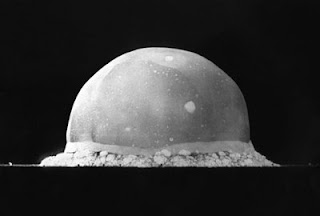What is a conspiracy theorist?
To answer this question etymology would require analysis of both words, and linguistics would demand a drawn out discussion over the expression’s application and implications. Inference can always trump intent in this regard. And who am I to say otherwise?
But, for the sake of this presentation, I'd like to start with a conglomeration of the most commonly applied definitions: "one who seeks to explain an event or set of circumstances as the result of a secret plot of usually illegal or immoral means to an illegal or immoral end, often by powerful collaborators" and examine the extent to which it can be reasonably applied.
Whenever two or three are gathered in my name
When the freedom of religion is in effect, the establishment of a church or observation of a religion hardly necessitates a conspiracy, but there was a time when your spiritual loyalty could have amounted to treason. So if you worshiped secretly under such rule, according to the governing authority, you very well might've been guilty of disloyalty.
The Crusades were carried out openly and clearly with this in mind: To battle a conspiracy against the pope. So at the heart of western Christianity we have a pretty powerful group of conspiracy theorists, if not a conspiracy itself.
And what about war in general?
Is it not by definition a conspiracy to keep secret your plans to murder? Well, in the United States, for this reason, the US Congress is given sole authority to declare war. A declaration of anything can hardly be called a secret, especially when put to public vote by several hundred representatives elected to act on behalf of the taxpayers funding the undertaking. And, morally speaking, the declaration of war is as much for the targets of the destruction it entails, thereby giving the would-be recipients of the incoming explosives fair chance to surrender in advance (or stop whatever it is they are doing to make someone else want to scathe them).
Did the atomic bombing of Hiroshima and Nagasaki meet this threshold? Japanese fighter jets attacked Pearl Harbor, and war was subsequently declared. One could question the morality of the disproportionate coming kill, and debate the credibility of the theory that, had the US not dropped those bombs, we’d still have desperate Japanese in our homeland hacking up with their samurai swords the last blood-splattering and bone-splintering bits of innocent Americans.
Yet still, one might justify the detonations by pointing out that the Manhattan Project was initiated because of founded fears that the Germans were researching the same thing, and that to sit on this knowledge and not beat them to "the punch" would have been a less moral alternative.
Does this mean that it wasn't immoral? And as far as its legality is concerned, how about not targeting civilian noncombatants?
So say what you want about the origin and nature of World War II; apply the non-binding “all is fair in love and war” philosophy if you want; but the creation and use of those two atomic weapons was nothing short of conspiracy. And this is not me theorizing, it’s a part of American heritage and national pride.
Flash forward to the case of Iraq in 2002 and 2003. Although the Congress never officially declared war, approval to use military force was sought and achieved as part of the public record. It’s been said, on the other hand, that the vote for that authority was taken under false pretenses. This may be so, but the “no" voters cited evidence in the intelligence report as grounds for the resolution's rejection; that would be the same intelligence report upon which the others had based their endorsement of the resolution.
These same, who now say that they regret having been misled by the current US administration, claim that the intelligence was “cherry picked”. I suppose they would have to know, since if they'd read the entire report and still voted for the resolution, they’d have to have been reaching for some of the redder drupe themselves.
I’m not sure what it was they felt had been left out of the report. Perhaps if they'd been bold enough to jump right in and take a look and to ask the right questions, we might have some more informed ideas. Short of that, one must do their own "theorizing".
Thence springeth forth the conspiracy theorist.
So questions in this case are:
Was the resolution's intent to deceive?
And what of those of the intelligence report?
And what of the substance of that report?
Where can one place responsibility for false intelligence, when you have a triangle in which Angle A points to Angle B, Angle B points to Angle C, and Angle C isn’t really authorized to reveal anything more than a cordial lie? I am reminded of postulates and theorems in geometry.
And what about Great Britain? They had their own battle regarding a certain dossier related to the war’s justification, and conspiracy theorists in this matter include the triangle of Andrew Gilligan, Alastair Campbell, and Dr. David Kelly, all of whom also pointed to their own personal conspiracy theory; that is, each was concerned with his own issue and consequently directing attention elsewhere.
It would seem, when judging these matters, that whichever version of events you choose to say you believe, you are theorizing your own conspiracy. But wait!
Apparently one is spared this label if he believes the official interpretation. Only when you don’t believe what you are told by the highest authority are you part and parcel of the conspiracy theorization premise.
At our service, ad hoc commissions, committees, and/or inquiries established for when a particularly sensitive matter requires more than the standard law enforcement investigation and subsequent trial. These are usually called to life in lieu of the normal procedure. Why forgo the standard legal process? I have a theory...

..but I wouldn't want to burst anyone's bubble.



